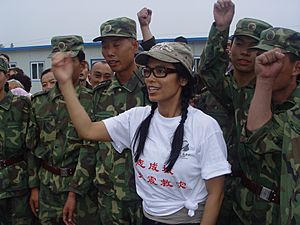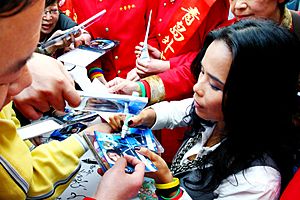Wei Wei (singer) facts for kids
Quick facts for kids
Wei Wei
|
|
|---|---|
|
韦唯
|
|

Wei in 2011
|
|
| Standing Committee Member of the All-China Youth Federation | |
| In office 2005–2010 |
|
| President | Zhao Yong |
| Vice President | Peng Liyuan |
| Ambassador of the Chinese Football Association | |
| In office 2008–2009 |
|
| President | Yuan Weimin |
| Ambassador of Forestry of the National Forestry and Grassland Administration | |
| In office 2009–2010 |
|
| Minister | Jia Zhibang |
| Personal details | |
| Born | 28 September 1963 Hohhot, Inner Mongolia, China |
| Spouse | Michael Joseph Smith (1995–2004) |
| Children | Symington W. Smith, Remington W. Smith, Vinson W. Smith |
| Residence | Beijing |
| Alma mater | Central Conservatory of Music |
| Occupation |
|
| Awards | 24th Sopot International Song Festival Winner & Miss Photo Category Winner (1987) Honorary Doctorate, East China University of Political Science and Law (2009) Golden Phoenix Award (2008) 1st Level National Professional Qualification Certificate (1986) |
Wei Wei (simplified Chinese: 韦唯; traditional Chinese: 韋唯; pinyin: Wéi Wéi; born on September 28, 1963) is a famous Chinese singer, actress, and professor. People often call her "The Empress of Pop" because she is known for her amazing singing and artistic talent. She is one of the most important Chinese entertainers of her time. Her music and performances made her a very influential person in Chinese pop culture during the 1990s and early 2000s.
Wei started performing in singing and dancing contests when she was a child. Her big break came in 1986 when she won a national singing contest in China. She also won the 24th Sopot International Song Festival in Poland that same year. Later, she sang a duet with Spanish singer Julio Iglesias at the 1993 East Asian Games in Shanghai.
Wei is closely connected to sports and the Olympics. She has been an Olympic Cultural Ambassador for China since 1993. She was the only cultural representative from Asia at the 1996 Summer Olympics. Wei has performed at many big events, including the closing ceremony of the 2008 Summer Olympics.
Her songs have been chosen as official theme songs for many major sports events in China. For example, her song "I Want to Fly" was the official theme song for the 2008 Olympic Sailing events. In 2007, she was even called the "Queen of Sports" for her contributions to Chinese sports culture.
Wei is one of Asia's best-selling music artists, having sold an estimated 100-200 million records worldwide. She is considered a "national treasure" in China. She was the first pop singer from mainland China to compete internationally. She was also the first artist from the Zhuang ethnic group to represent China around the world. Wei was the first woman chosen as China's Olympic Cultural Ambassador. She was also one of the first Chinese artists to release music online. A special dress designed for her for the 2008 Olympics is now on display in a museum in Sweden.
Contents
Early Life and Training
Wei was born in Hohhot, Inner Mongolia, China. Her family belongs to the Zhuang ethnic group. Her father was a veteran and worked for the railway. Wei started practicing performing arts when she was very young. When she was 7, her family moved to Liuzhou. At 14, she moved to Beijing to work for the China National Song & Dance Ensemble. There, she learned dancing, singing, playing instruments, and stage design. Her group traveled all over China, often performing many times a day. She later studied at the Central Conservatory of Music in Beijing.
Career Highlights
Early Success and National Recognition
In 1986, Wei won the National Young Singers contest on Chinese television. She sang the song Wanna Take One More Chance to Look at You. In 1987, she won the 24th Sopot International Music Festival in Poland. She was the first Chinese artist to represent China in an international pop music competition. In 1986, she received a special "2nd Level National Performer Professional Qualification Certificate." A year later, she earned the "1st Level National Performer Professional Qualification Certificate." This is the highest professional qualification in her field in China, allowing her to teach at music academies.
Rising to Stardom
In 1988, Wei sang the theme song for China Central Television's CCTV New Year's Gala. In 1989, her song Dedication of Love became a huge national hit. This song helped her become a symbol for charity work. Her performance helped raise money for a rural worker to get spinal surgery. That same year, her song Today is Your Birthday won a Gold Medal. It has since been used to celebrate China's National Day. In 1990, her song Asian Mighty Winds was chosen as the theme for the 1990 Asian Games. She performed it with Chinese singer Liu Huan. This song also became a national hit, and Wei was called the "Queen of Sports." In 1991, she starred in the film The Story of A Songstress. She also performed at the Miss Asia Pageant in Hong Kong in 1992.
International Performances

In 1993, Wei was the main singer at the 1993 East Asian Games opening and closing ceremonies with Julio Iglesias. She sang Asian Mighty Winds again at the 1994 Asian Games in Japan. Later that year, she was one of only two singers chosen to visit Monaco to support Beijing's bid to host the Olympic Games. In 1994, she was named Star of the Night after performing Dedication of Love at the CCTV New Year's Gala in Carnegie Hall, New York. Her first English album, The Twilight, was also released.
After her performance at Carnegie Hall, she started her "Wei Wei and the World" concert tour. She visited and performed in major Chinese cities like Beijing and Shanghai.
In 1996, Wei performed at Centennial Olympic Park in Atlanta for the Olympics. She was Asia's only cultural representative at the games. She was interviewed in a special fifteen-minute show on CNN. In 1999, her album Wei Wei's Devotion was very popular in China. In 2000, she helped the Chinese Olympic Committee campaign for the Beijing 2008 Summer Olympics. She also performed with the Sydney Opera and Shanghai Opera.
Olympic Ambassador and Recent Work
In 2003, Wei was a special guest at events honoring healthcare workers after the SARS epidemic. She also started her own international management company. In 2004, she continued to perform for Olympic and sports events. She was the main performer at the opening ceremony for the Formula 1 Racetrack in Shanghai. She sang Andrew Lloyd Webber's song Love Changes Everything for China's Olympic slogan "One World, One Dream." An online survey in 2004 showed that Wei was the most popular choice to sing the theme song for the Chinese Olympics.
From 2005 to 2010, Wei was a Standing Committee Member of the All-China Youth Federation.
In 2006, she celebrated twenty years on stage with her biography The New Wei, My New Way. She also released twenty new recordings of her greatest hits. She released music worldwide on iTunes and started an international tour for the Chinese New Year. She also served as a judge on China's biggest singing competition.
In 2007, she became an Ambassador for the Chinese Football Association. Her song Go, Girl Go! became the official theme song of the 2007 FIFA Women's World Cup. Famous FC Barcelona players like Lionel Messi appeared in the music video.
In 2008, Wei performed in the Chinese New Year All Star Show '08. She also performed at the Swedish show Allsång på Skansen. She was appointed a Musical Ambassador for the Beijing 2008 Olympics. At the closing ceremony of the 2008 Summer Olympics, Wei performed Surpass with Chinese singer Sun Nan. From 2009 to 2010, she was China's Forestry Ambassador to the United Nations.
In 2014, Wei competed in the singing competition show I Am a Singer (Chinese season 2).
Recent Activities
In 2022, Wei returned to the spotlight as one of the main singers for the 2022 Winter Olympics' theme song "Together for the Future." She was also appointed a Visiting Professor of Music at Shinawatra University in Thailand.
In 2023, Wei returned to China and made her debut in musical theatre. She performed as a lead actress in the musical ..., which premiered in Harbin city. In November 2023, she received the 2023 Elle Style Award. In 2024, Wei led the 2024 Yale Sinovation Forum, discussing the role of women in business. She also performed at China's Strawberry Music Festival.
Charity Work

Wei has performed at many charity shows throughout her career. In 1991, she sang Dedication of Love at a charity show for flood victims in China. In 2004, she performed the same song with Yang Haito, a blind artist, at a charity event for people with disabilities. In 2005, she performed at "The Happiness Project" charity show for mothers.
In 2012, she attended a charity auction with her three children. A dress she wore at the 2008 Beijing Olympics was auctioned for a record amount, and all the money went to charity. That same year, she was named China's Oceanic Goodwill Ambassador.
In 2013, she performed Dedication of Love at a charity run in Beijing to raise money for cancer research. She was awarded a world record for "the most number of people who sang Dedication of Love using sign language at the same time in the world."
Personal Life
Wei married American composer Michael Joseph Smith in 1995. They had three sons: Symington, Remington, and Vinson. They divorced in 2005, and she moved with her children from Sweden back to Beijing, China.
Wei is a long-time friend of Hong Kong actor Jackie Chan and Chinese-Singaporean actress Gong Li.
Legacy
Wei is widely seen as a national treasure in China and one of its most famous singers. She was the first pop singer from mainland China to officially represent the country in international competitions. She was also the first artist from the Zhuang ethnic group to represent China internationally. Wei was the first woman to be chosen as China's Olympic Ambassador. She was also one of the first Chinese artists to use the internet to release music.
Journalists have praised Wei's talent and influence. One journalist wrote that "Wei Wei is China's biggest pop star and its most attractive ambassador." Another described her voice as a mix between famous singers. In Sweden, Wei has often been called "China's Madonna" because of her similar career path and success.
In 2015, she received an honorary doctorate from the East China University of Political Science and Law. She also holds a world record for the largest number of people performing a sing-along using sign language. With an estimated 100-200 million records sold, she is one of the best-selling artists from mainland China during the 1990s. She has been called "China's Whitney Houston" and "China's Madonna."
Discography
- The Album (1986)
- Bright Eyes (1987)
- The Four Points of Love (1988)
- Endless Love 无限的爱 (1989)
- I Love My Motherland 我爱我的祖国 (1990)
- Famous Songs (1992)
- The Twilight (1994)
- Wei Wei 韦唯 (1998)
- Wei Wei's Devotion (1999)
- Dedication of Love 爱的奉献 (2001)
- Myths of China 中国的神话 (2005)
- Yang Chin (2006)
- 20x20 (2008)
Filmography
- The Story of a Star 女歌星的故事 (1991)
See also
 In Spanish: Wei Wei (cantante) para niños
In Spanish: Wei Wei (cantante) para niños


